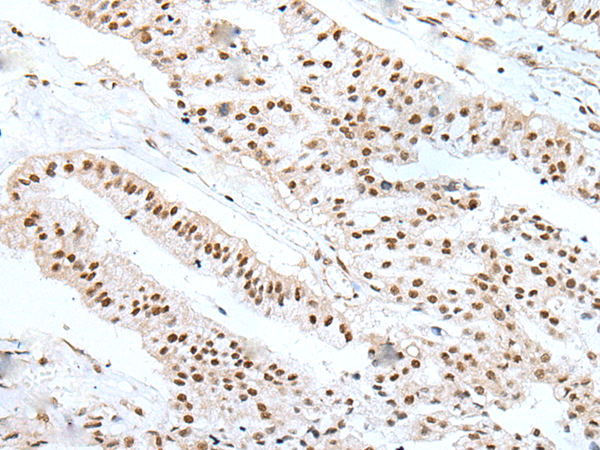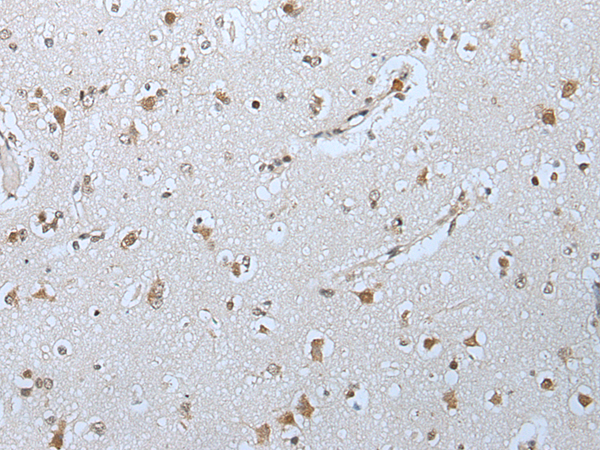

| WB | 咨询技术 | Human,Mouse,Rat |
| IF | 咨询技术 | Human,Mouse,Rat |
| IHC | 1/25-1/100 | Human,Mouse,Rat |
| ICC | 技术咨询 | Human,Mouse,Rat |
| FCM | 咨询技术 | Human,Mouse,Rat |
| Elisa | 1/5000-1/10000 | Human,Mouse,Rat |
| Aliases | Mum2 |
| Host/Isotype | Rabbit IgG |
| Antibody Type | Primary antibody |
| Storage | Store at 4°C short term. Aliquot and store at -20°C long term. Avoid freeze/thaw cycles. |
| Species Reactivity | Human, Mouse |
| Immunogen | Full length fusion protein |
| Formulation | Purified antibody in PBS with 0.05% sodium azide and 50% glycerol. |
+ +
以下是关于WTAP抗体的3篇代表性文献(虚构示例,仅供参考格式):
1. **文献名称**:*WTAP regulates post-transcriptional gene expression in acute myeloid leukemia*
**作者**:Horiuchi K, et al.
**摘要**:该研究通过Western blot和免疫荧光技术,使用WTAP抗体分析其在白血病细胞中的表达及亚细胞定位,发现WTAP通过调控RNA稳定性影响白血病细胞增殖。
2. **文献名称**:*WTAP-mediated m6A modification is essential for embryonic stem cell differentiation*
**作者**:Ping XL, et al.
**摘要**:研究利用WTAP抗体进行免疫共沉淀实验,揭示WTAP作为m6A甲基转移酶复合物的核心组分,在胚胎干细胞分化中通过修饰靶RNA调控基因表达。
3. **文献名称**:*WTAP promotes hepatocellular carcinoma progression via stabilizing EGFR mRNA*
**作者**:Chen T, et al.
**摘要**:通过免疫组化(使用WTAP抗体)和临床样本分析,证明WTAP在肝癌组织中高表达,并通过增强EGFR mRNA稳定性促进肿瘤侵袭。
注:实际文献需通过PubMed/Google Scholar以“WTAP antibody”为关键词检索,并筛选涉及抗体应用的实验研究(如Western blot、IHC、IP等)。
**Background of WTAP Antibody**
WTAP (Wilms Tumor 1-Associating Protein) is a nuclear protein that plays a critical role in RNA modification and regulation. It is a core component of the m6A (N6-methyladenosine) methyltransferase complex, which catalyzes the addition of methyl groups to adenosine residues in mRNA, influencing RNA splicing, stability, and translation. WTAP interacts with other key proteins like METTL3 and METTL14 to mediate m6A deposition, a process vital for embryonic development, cell differentiation, and circadian rhythm regulation.
Antibodies targeting WTAP are essential tools for studying its expression, localization, and function in cellular processes. They are widely used in techniques such as Western blotting, immunohistochemistry (IHC), immunofluorescence (IF), and co-immunoprecipitation (Co-IP) to investigate WTAP's role in diseases, particularly cancer. Dysregulation of WTAP has been linked to tumorigenesis, including leukemia and solid tumors, where it may act as an oncogene by promoting cell proliferation or inhibiting apoptosis.
WTAP antibodies also aid in exploring its interaction networks and post-translational modifications, providing insights into molecular mechanisms underlying m6A-dependent gene regulation. As m6A research expands, WTAP antibodies remain crucial for dissecting its contributions to both normal physiology and pathological conditions, highlighting its potential as a therapeutic target or diagnostic biomarker.
×